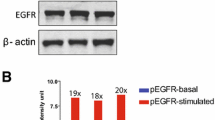Abstract.
The relationship between expression and function of the epidermal growth factor (EGF) family of receptors and chemosensitivity remains controversial. We studied the chemosensitivity to various anticancer agents of human cervical squamous carcinoma ME180 cells, and two resistant subclones, ME180/TNF and ME180/Pt, which also differ in their EGF receptor (EGFR) expression. Compared with ME180 cells, EGFR is overexpressed sixfold in ME180/TNF cells and is barely detectable in ME180/Pt cells. Cell cycle analysis by flow cytometry and BrdU incorporation into DNA showed a correlation between EGFR expression and percentage of cells in S phase and active DNA replication (35% in high EGFR-expressing ME180/TNF cells, 19% in non-EGFR-expressing ME180/Pt cells and 23% in parental, intermediate-level EGFR-expressing ME180 cells). By MTT assay and compared with parental, intermediate-level EGFR-expressing ME180 cells, high EGFR-expressing ME180/TNF cells had a three- to fourfold increased sensitivity to cisplatin, camptothecin (CPT), and topotecan, and low EGFR-expressing ME180/Pt cells had a five- to ninefold reduced sensitivity to the same agents. In contrast, the degree of cross-resistance with the topoisomerase II inhibitors doxorubicin and etoposide was minimal and the pattern of sensitivity to the anti-microtubulin agents vinblastine and paclitaxel was different, with a two- to fourfold decreased sensitivity in the high EGFR-expressing ME180/TNF cells and only a 1.5-fold decreased sensitivity in the low EGFR-expressing ME180/Pt cells. Neither alterations in intracellular CPT levels nor changes in topoisomerase I expression or activity, measured as ability to form DNA-protein complexes, were found to explain the differences in sensitivity to CPT among the three cell lines. Co-treatment with CP358774, a specific EGFR tyrosine kinase inhibitor, reduced the enhanced sensitivity of high EGFR-expressing ME180/TNF cells to the values observed in intermediate EGFR-expressing ME180 cells, but only reduced modestly the sensitivity of intermediate expressing ME180 cells. As a result, the resistance index of low EGFR-expressing ME180/Pt cells compared with intermediate EGFR-expressing ME180 cells was reduced only from five- to fourfold for cisplatin and from seven- to fourfold for CPT when ME180 cells were exposed to CP358774. CP358774 did not affect the sensitivity to either agent in low EGFR-expressing ME180/Pt cells. These results provide evidence that changes in EGFR expression or function may play a role in determining chemosensitivity to platinum and topoisomerase I poisons in some human tumor systems, and that the EGFR-related changes in chemosensitivity may vary depending on the level of EGFR expression and/or function.
Similar content being viewed by others
Author information
Authors and Affiliations
Additional information
Electronic Publication
Rights and permissions
About this article
Cite this article
Ling, YH., Donato, N. . & Perez-Soler, R. Sensitivity to topoisomerase I inhibitors and cisplatin is associated with epidermal growth factor receptor expression in human cervical squamous carcinoma ME180 sublines. Cancer Chemother Pharmacol 47, 473–480 (2001). https://doi.org/10.1007/s002800000239
Received:
Accepted:
Issue Date:
DOI: https://doi.org/10.1007/s002800000239




